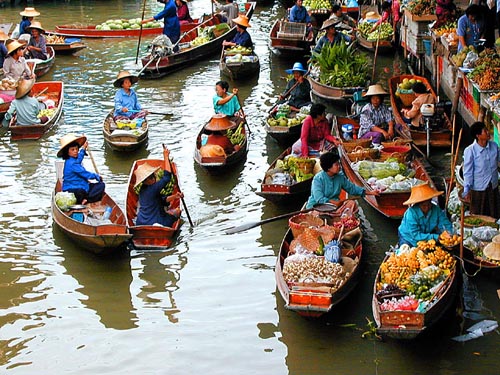
In Praise of Exatriates - The easiest way to become an expatriate is to volunteer for the Peace Corps
On the Bus James Eckardt
140 m.m X 210 m.m
208 pages
Softcover
US$ 7.65
IN PRAISE 0F EXPATRIATES
Normal stay-at-home people have an image of expatriates as a bunch of cynical, hard-drinking, womanising, amoral layabouts.
Well, they're right.
So what?
"Living well is the best revenge," said Gerald Murphy, expatriate friend of
F. Scott Fitzgerald. By "well", he meant the enjoyment of foreign travel, foreign languages, history, art, music, food . . . All expatriates agree that You Can't Go Home Again. And, what's more, we won't!
The easiest way to become an expatriate is to volunteer for the Peace Corps or VSO or CUSO. Not only do they feed you but give you free language training. After two years' service, you're at home in both a foreign language and culture. Many volunteers extend for a third year and by that time they're probably married. In the Philippines and Brazil, half the Peace Corps volunteers marry locals; in Thailand, about one in three. By that time, you are committed body and soul to a culture that, however foreign at first, has become part of you. You are very very different from the person who first stepped off that plane at Don Muang.
"At one point in your life you choose a country, " a long-time English resident of Bangkok once told me. "And later on, you find that the country has chosen you." So you can't go home again even if you wanted. And if you do, you're quickly disappointed. Your friends' hometown stories bore you; your stories of Thailand bore, and mystify, them.
The volunteers stay on and move up into jobs in business, education, development, and raise kids that are biracial, bilingual, bicultural. More power to them.
The second type of expatriates are the professionals. The most common group are petroleum engineers, mechanics, geologists. helicopter pilot--known, in technical language, as "oil field trash". Beefy, sunburned men in baseball caps, they can be found every night lining the barstools of Patpong. If you had just come off a year's contract in a Mideast country, dry and celibate, where the hell might you be found?
Oil field trash suffer from a bad press. A British consular officer once told me that the people who get into bar-room fights are not the oil field workers, who just want a good time, but "upper class tourist twits" . Many oil workers, after years on isolated rigs offshore or in the desert, are extremely well read. And many have made an effort to learn Thai, Spanish, French, Malay, Tagalog. And many have married into the tribe.
In Songkhla, for example, the workers on the Unocal offshore rigs are English, Australian, Canadian, Scottish, American, French, Irish, Japanese, Singaporean, Indian, Iranian; theirwives are Indonesians, Filipinas, Thai, Malaysians, Singaporeans, Bolivians, Brazilians. The refreshing difference between expatriates nowadays and 50 years ago is the general absence of racism. People do love making fun of each other's countries, but no one takes offence because we know, deep down, that we all belong to a single supranational tribe. We are expats. We have much more in common with each other than with a stranger from our home country. And the one trait we all share, besides a thirst for beer, is the love of a good story.
Storytime:
--Tony Coalson, our town's pioneer helicopter pilot, drove the first Sikorski from London to Songkhla. He'd been a pilot in Vietnam, one of the last to take off from the roof of the American Embassy. He disliked, to put it mildly, the Vietnamese: He loved the Thai, learning to read, write and speak the language. Tony had to be dragged kicking and screaming out of Songkhla to his next post: Calcutta. He hated Calcutta. He finally managed to get back to Thailand and: "I swear, when I got to Don Muang, I dropped to my knees and, just like the Pope, I kissed the tarmac and thanked Gawd I was back in Civilisation!"
--Snapper Don, a VSO volunteer in Botswana in 1978, walked into a South African hamburger joint with his Peace Corps girlfriend. Problem was, she was black. Refused service, she picked up a table and threw it through a plate glass window. Snapper Don followed it with two chairs: "Seemed the proper thing to do."
--Henrick the Dutchman, suffering under Sharia Law in the Sudan, went for months without a beer in the desert. He finally found the equivalent of the Copa-cabana in Khartoum: a qrass hut where you ordered a beer from a little old lady who then went out to her backyard with a shovel and dug up a rusty can of Heinekin. A policeman guarded the gate of the compound and refused to let you leave unless you gave him a can too.
--Jim Carney, on an exploration site in the middle of the Amazon, regularly flew out aboard a creaky World War 11 DC-2. The preflight drill was to weigh each of the dozen passengers and seat the heavier ones up front so the plane could take off. Heavyweight Jim was right next to the cockpit where he could overhear the conversation between pilot and co-pilot. Bad place to be. Down below stretched five hundred miles of three-tier jungle and suddenly the pilots were pulling out maps and scratching their heads and asking each other: "Where are we?"
"As soon as we landed," Jim said, "I went on a crash diet."
At Christmastime, thoughts return to your childhood home. As I watch my four kids decorate the palm tree in our front yard, I remember my German grandfather telling me about Christmas in "the old country". The USA became his new country, as Thailand is mine. And I wonder where my own kids will wind up. The only parental advice I can give is: "Stay a moving target."